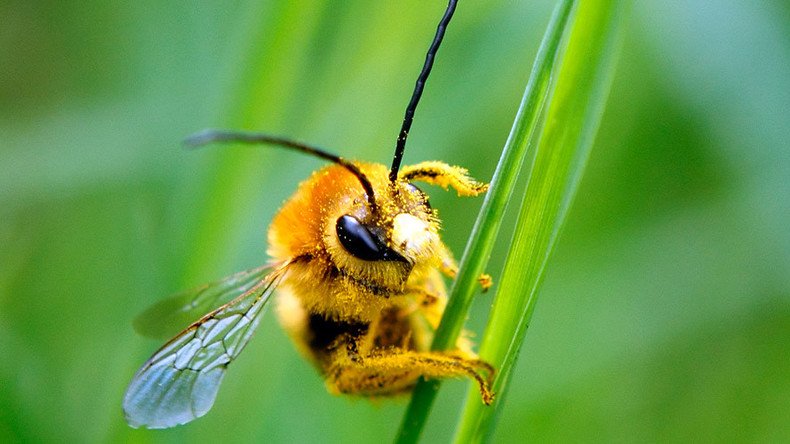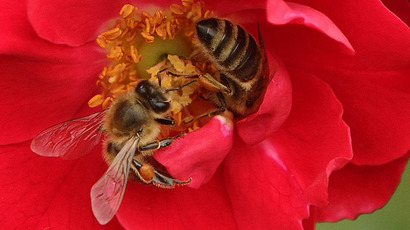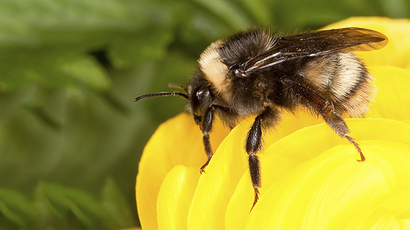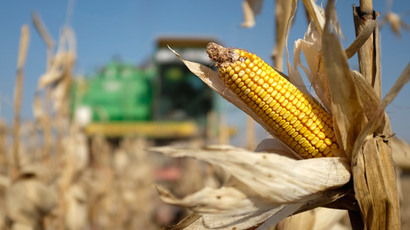Bee bandits: Hive theft in California spikes before almond season

California beekeepers have reported "unprecedented levels" of hive theft in recent months, just in time for the state's almond pollination season. As the US bee population continues to decline, the hives have become much more valuable.
The state's hundreds of thousands of acres of almond orchards – which produce about 80 percent of the world's almonds – are served by hives that are rented and trucked in on easy-to-steal pallets by beekeepers from all over the US. Mobile hives are increasingly important, and valuable, as the bee population in the US has decreased rapidly in recent years.
It's a great day--National #Almond Day! https://t.co/YauZp3ieur
— AHPA (@AHPAalmonds) February 16, 2016
The exact cause of the mass deaths is ambiguous and subject to fierce debate, as various camps blame the overuse of neonicotinoid insecticides or the bee-ravaging varroa mite parasite, among other causes. There is even a White House Pollinator Health Task Force, which aims to reduce honeybee colony collapse over the next decade.
EPA admits popular insecticide threatens honeybeeshttps://t.co/zdrvNTbHvmpic.twitter.com/I3pV6NBFNi
— RT America (@RT_America) January 8, 2016
Amid these high stakes for crops like almonds in an important agricultural state like California, beekeepers and investigators have reported record hive thefts this season, according to the Washington Post and the California State Beekeepers Association. Average hive rental prices have hit $200, up from $130 in 2010, according to the Post.
Butte County, California, Detective Jay Freeman said theft has shot up this year, as 280 stolen hives, for instance, represents about $100,000 in losses for a beekeeper.
“The numbers – the 240 and 280 is a little unusual,” Freeman told the Post. “In the past few years when I’ve been investigating hive thefts, it’s been 20 here, 40 there. There was one that was 128, but it seemed to be significantly lower in number than the ones this year.”
Bee hive thefts happening, that must be hard to track! https://t.co/8l7jic25B4#bees#savethebees#beenews#bestbeebrothers#theft
— Best Bee Brothers (@bestbeebrothers) February 4, 2016
Stolen hives are usually considered lost forever, with little chance of recovery, according to Joy Pendell, media director at the California State Beekeepers Association.
“Most people, when they lose their hives, figure they’re never going to get found,” Pendell said. “It’s very frustrating for us, because we go all winter without any income. So we put all this money and work into them for months, and we’re about to have our payday and someone just goes and steals it.”
The state beekeepers website lists several recent hive thefts in the state's almond country: 250 hives around Elk Grove, 29 hives in Lincoln, 122 hives in Butte County. "The thieves are getting bolder and we all must be vigilant," said one theft alert near Kern County.
Pendell told the Post that "easily over a thousand" hives have been stolen in California just this year. She said her organization advocates hive registration with the state, as many beekeepers do not label their hives despite basic equipment-labeling requirements in California.
“There does need to be a registration process,” she said. “A good, clear registration process… Hopefully we can get some legislation passed in the next few years.”
Detective Freeman said he has recovered 64 stolen hives this year, adding that he hopes a grand theft conviction, which could mean as many as three years in prison, will deter future crime.















